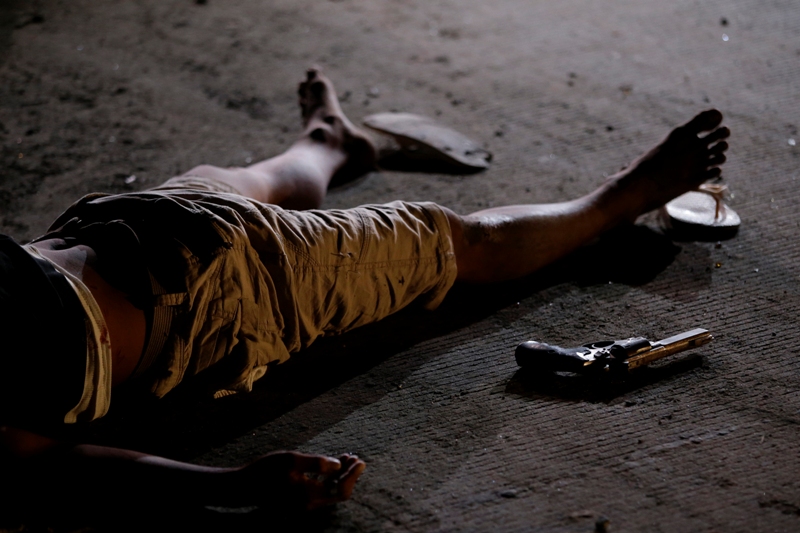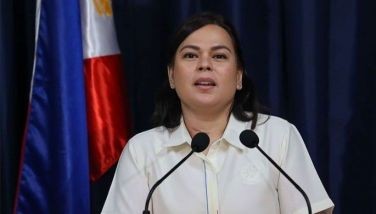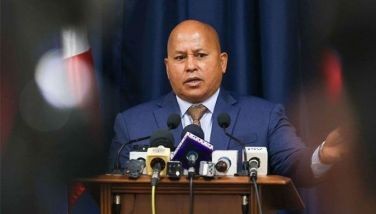Philippines tells UN rights body: No extrajudicial killings

During the session of the UNHRC in Geneva, Switzerland yesterday, the Philippines said it could only accept 103 of the 257 recommendations made during its third Universal Periodic Review (UPR) of the Philippine human rights situation in May. AP/Aaron Favila, File
MANILA, Philippines — The Philippine government has denied the existence of extrajudicial killings in the country before the United Nations Human Rights Council (UNHRC), rejecting several recommendations of member-states to address rights issues.
During the session of the UNHRC in Geneva, Switzerland yesterday, the Philippines said it could only accept 103 of the 257 recommendations made during its third Universal Periodic Review (UPR) of the Philippine human rights situation in May.
“While the Philippines can essentially support an additional 99 recommendations, the state cannot guarantee or commit to their fruition given that the results of processes required to implement them are beyond the sole control of any of the branches of the government,” the country’s statement read.
“The state could not support a total of 55 recommendations. While the Philippines continues to carry out its responsibilities in upholding respect, promotion and protection of human rights, the state could not agree to the recommendations’ premises and contexts,” it added.
Based on its report, the Philippines said the recommendations that it could not fully support “were sweeping, vague and even contradictory, especially in the context of the Philippines’ democratic processes.”
The recommendations that were not fully accepted include those that call for a thorough investigation of reported extrajudicial killings in the country.
Also not accepted were calls against the re-imposition of the death penalty, lowering of the minimum age of criminal liability and requests to allow UN special rapporteur on extrajudicial killings Agnes Callamard to conduct a visit in the country.
“Recommendations referring to extrajudicial killings allegedly resulting from the anti-illegal drug campaign of the administration were already addressed in the interactive dialogue,” said the Philippines.
“These are deaths arising from legitimate law enforcement operations or deaths that require further investigation following the established rules of engagement by the country’s law enforcers,” it added.
On death penalty and minimum age of criminal liability, the Philippines said these are subject to further deliberations in Congress and would include comprehensive consultations with all stakeholders.
Accepted recommendations
Meanwhile, the Philippines has accepted recommendations to ensure the effective implementation of laws to ensure protection of women, the elderly and persons with disabilities.
Also accepted were recommendations urging the Philippines to develop a national human rights plan.
The country also vowed to strengthen cooperation with national and international human rights institutions to implement the national human rights action plan.
On illegal drugs, the Philippines accepted the recommendation of Venezuela to strengthen its campaign against illegal drugs.
Also accepted were recommendations to combat drug trafficking while upholding human rights values.
“The Philippines recognizes the recommendations of member-states, which reflect recognition and respect for the state’s implementation of its human rights commitments and do not seek to impose a certain standard on the state’s pursuit of human rights,” it said.
In its statement before the UNHRC, the Commission on Human Rights (CHR) of the Philippines slammed the government for the creeping culture of impunity in the country.
The statement delivered by commissioner Karen Gomez-Dumpit noted the war against illegal drugs, extension of martial law in Mindanao, pursuit of legislative agenda to reintroduce the death penalty and lowering the minimum age of criminal liability, and the discovery of a secret detention cell at a police station.
Also mentioned were the public threats against journalists and human rights defenders, as well as the reduction of budget of the commission.
The delegates of the United Kingdom and United States lamented the rejection of recommendations involving extrajudicial killings and called on the Philippines to investigate the deaths in the war on drugs.
In response, Philippine ambassador to the UN in Geneva Evan Garcia maintained that there is no culture of impunity in the country.
Human Rights Watch (HRW) expressed dismay yesterday over the Philippines’ rejection of recommendations of a UN human rights body on ways to address the country’s drug problems.
“We are dismayed that the Philippines rejected all UPR recommendations that would make a practical difference in ending extrajudicial killings perpetrated in the name of its murderous war on drugs,” the HRW said in a statement.
The Philippines rejected Peru’s recommendation to cooperate with special procedures by extending a standing invitation, and recommendations by Ghana, Hungary and others to allow access to the special rapporteur on extrajudicial executions, without conditions that might compromise her impartiality.
“We remind Philippines of its obligation as a member to cooperate with the council and its mechanisms,” it said. – With Helen Flores
- Latest
- Trending




























